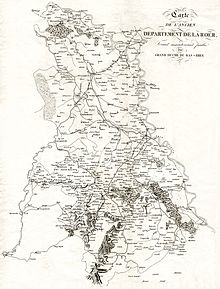Consistoire Krefeld
The Consistoire Krefeld (German: Konsistorium Krefeld), based in the city of Krefeld , like the Consistoire central israélite and another twelve regional consistories, was created by Napoleon Bonaparte by an imperial decree of March 15, 1808. The areas on the left bank of the Rhine were incorporated into the territory of the French state until 1814 .
tasks
The consistories, which were given semi-state status, were supposed to regulate the internal affairs of the Jewish religious community based on the Protestant model . The consistory had to administer the cult, to encourage the Jews to exercise useful professions and to nominate the Jewish recruits to the authorities .
At the top of the three-tier hierarchical structure was the Consistoire central israélite (Central Consistory) in Paris , to which the regional consistories (Consistoires régionaux) were subordinate, to which the individual Jewish communities (communautés juives) were subordinate. The consistories had the task of supervising the practice of religion within the state laws and of setting and collecting taxes so that the organs of the Jewish denomination could meet their expenses. At the end of French rule there were six consistories in what was to become Germany; Krefeld, Mainz, Koblenz (from January 1, 1811 Bonn), Trier, Hamburg and Emden.
Each regional consistory had a chief rabbi and four lay members who were elected by the Jewish notables of the affiliated communities. The chief rabbi of the Krefeld consistory was Löb Carlburg .
After Napoleon's defeat in 1814, the areas on the left bank of the Rhine were redistributed at the Congress of Vienna and fell to Prussia.
area
In 1808, the Krefeld Consistory was responsible for the Jewish communities of the following departments :
- Dyle , 56 people
- Escaut , 56 people
- Jemappes , 20 people
- Lys , 3 people
- Meuse-Inférieure , 490 people
- Deux-Nèthes , 49 people
- Ourthe , 97 people
-
Rur , 5,447 people; with the following 4 arrondissements:
- Arrondissement Aachen, 1,416 people
- Arrondissement of Cologne, 2,012 people
- Arrondissement Krefeld, 1,571 people
- Arrondissement Kleve, 485 people
In 1808, 6,218 Jewish citizens ( Citoyen ) lived in the départements .
Communes in the Rur department (1806)
The largest Jewish community existed in Krefeld and comprised 160 people. This city therefore also became the capital of the consistory. Aachen only had 60 Jewish residents. In contrast, 89 Jews lived in the village of Hottorf bei Linnich.
Prussian time
After 1815 the areas of Dyle, Escaut Jemappes, Lys, Meuse-Inférieure, Deux-Nèthes, and Ourthe , which were now part of the Kingdom of the Netherlands , were separated from the Krefeld consistory. This now belonged to the Kingdom of Prussia and existed until 1847.
Löb Carlburg exercised the office of chief rabbi until his death in 1835. His successor was Dr. Lion Ullmann († 1843). On August 6, 1844, Löb Bodenheimer was elected Chief Rabbi and was introduced to his office on May 8 and 9, 1845.
In 1845 there were three consistories in the Rhine Province: Bonn , Trier , and Krefeld. The latter was the largest and covered almost a third of the entire Rhine Province. Around 10,000 Jews lived here in around 130 communities. No parish consisted of more than 500 people. The largest communities were Krefeld with 80 families, followed by Aachen, Kleve, Goch, Frechen, Neuss, Kerpen, Wickerathberg, Bergheim and Langweiler. Many congregations were so small that they could just provide the necessary quorum ( minyan ) of ten religiously mature Jews in order to be able to hold the service in the synagogue.
In 1847 the first unified Prussian Landtag passed the law on the conditions of the Jews and abolished the consistorial system. From now on Löb Bodenheimer was rabbi of the Jewish community in Krefeld. It included the Krefeld district . He retained the title of Chief Rabbi on account of his honor.
literature
- Dictionnaire biographique des rabbins et autres ministres du culte israélite. France et Algérie, du Grand Sanhédrin (1807) à la loi de Séparation (1905) . Berg International Éditeurs, Paris 2007.
- Dieter Kastner (edit.): The Rhenish Provincial Parliament and the Emancipation of the Jews in the Rhineland 1825-1845 . A documentation in two parts (Rheinprovinz 2), Cologne / Bonn 1989, ISBN 3-7927-0909-0 .
- Cilli Kasper-Holtkotte: News in the West: Migration and its Consequences: German Jews as Pioneers of Jewish Life in Belgium, 18./19. Century. Leiden 2003.
swell
- ↑ Allgemeine Zeitung des Judentums 1845


